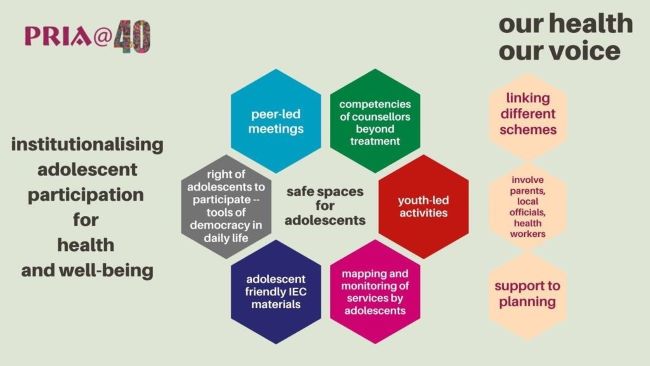PRIA, in collaboration with SHLC (University of Glasgow), Gurugram University, Gurugram and Martha Farrell Foundation (MFF) had organized a National Consultation on “Our Health, Our Voice- institutionalizing adolescent participation for improving their health and wellbeing” in hybrid mode (both online as well as off-line) on September 03, 2021. The national consultation was conducted to discuss the ways in which adolescent participation for their health and well-being can be enhanced and institutionalised through AFHCs to widen the outreach and penetration of services through active facilitation and involvement of civil society.
Detailed program note can be accessed here.
The following key questions were discussed as part of the consultation:
The consultation was attended by 54 participants. The speakers were drawn from civil society, academic institutions and research. Three sessions were organized:
In the first session, Mr Ram Aravind(research associate, PRIA) presented the key findings, learnings and methodology of ‘Our Health, Our Voice’ participatory action research study with adolescents in urban informal settlements in Gurugram. Post the presentation, adolescent champions from Gurugram , Jyoti and Manish presented the manifesto for improving adolescent health uptake through AFHCs. Refer to the manifesto here.
Dr. Indrani Bhattacharya (CEO, CINI, West Bengal), Dr Rama Shyam (Director, SNEHA, Mumbai) and Ms Suchitra Rath (Ekjut, Jharkhand) led the presentations in the second session, where they narrated experiences from their respective states with regard to efforts to integrate and institutionalise adolescent participation in health and well-being in three locations- West Bengal, Maharashtra and Jharkhand.
In the third session, Dr. Alka Barua (Independent Researcher), Dr Santhya KG(Population Council), Nandika Kumari(Dasra) and Binoy Acharya(Unnati) highlighted the importance of participation in adolescent health implementation through evidence. Finally, the session concluded with Dr Rajesh Tandon and Dr Nilesh Deshpande providing a historical perspective on citizen as well as adolescent participation in public policy.
The detailed report of the national consultation can be accessed here.
The video recording of the national consultation can be accessed here.
Key take-aways:
In order to institutionalise adolescent participation, it is important to create safe spaces. The starting point can be recognition of right of adolescents to participate and to empower them with tools of democracy in everyday life. Adolescent participation can be institutionalised by organising them into peer groups and organizing and promoting youth-led activities. To increase the stakes of adolescents in health, they need to be equipped with right information and awareness on the different components of adolescent health. Developing locally relevant IEC materials and honing skills and competencies of AFHC counsellors can be used to achieve this. Additionally, a multi-stakeholder approach to working on adolescent health issues need to be adopted. The key stakeholder to be involved in effecting behaviour change are the parents or guardians followed by local officials, elected representatives and health workers. Convergence of key schemes for adolescents can enable broader participation of adolescents in public policy across thematic areas.
